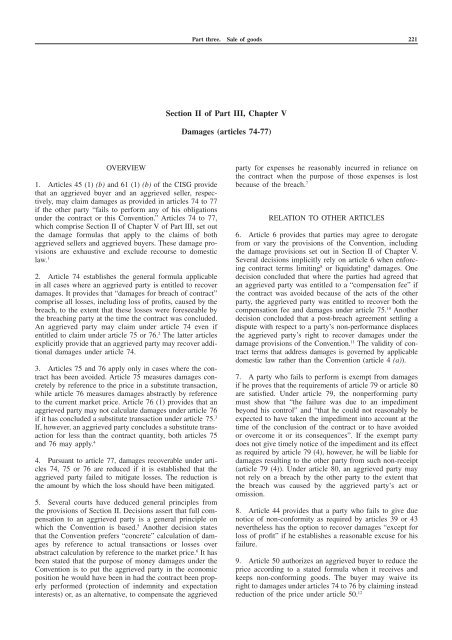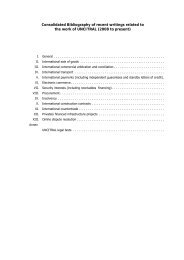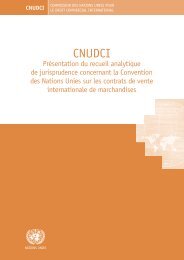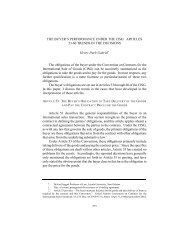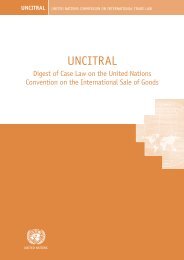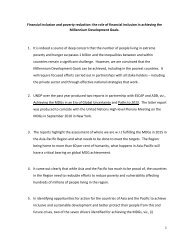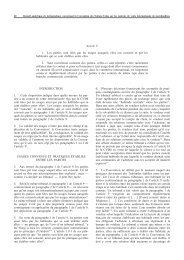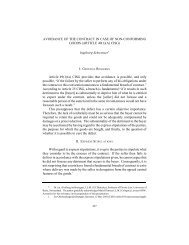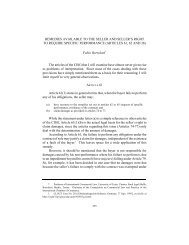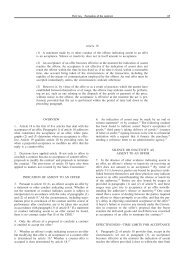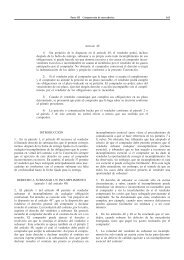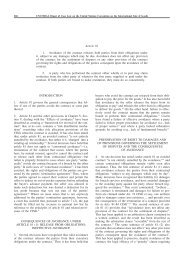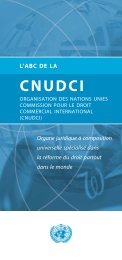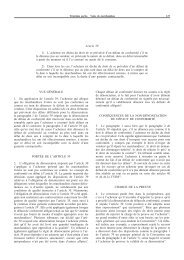Section II of Part III, Chapter V Damages (articles 74-77) - UNCITRAL
Section II of Part III, Chapter V Damages (articles 74-77) - UNCITRAL
Section II of Part III, Chapter V Damages (articles 74-77) - UNCITRAL
You also want an ePaper? Increase the reach of your titles
YUMPU automatically turns print PDFs into web optimized ePapers that Google loves.
<strong>Part</strong> three. Sale <strong>of</strong> goods 221<br />
<strong>Section</strong> <strong>II</strong> <strong>of</strong> <strong>Part</strong> <strong>II</strong>I, <strong>Chapter</strong> V<br />
<strong>Damages</strong> (<strong>articles</strong> <strong>74</strong>-<strong>77</strong>)<br />
OVERVIEW<br />
1. Articles 45 (1) (b) and 61 (1) (b) <strong>of</strong> the CISG provide<br />
that an aggrieved buyer and an aggrieved seller, respectively,<br />
may claim damages as provided in <strong>articles</strong> <strong>74</strong> to <strong>77</strong><br />
if the other party “fails to perform any <strong>of</strong> his obligations<br />
under the contract or this Convention.” Articles <strong>74</strong> to <strong>77</strong>,<br />
which comprise <strong>Section</strong> <strong>II</strong> <strong>of</strong> <strong>Chapter</strong> V <strong>of</strong> <strong>Part</strong> <strong>II</strong>I, set out<br />
the damage formulas that apply to the claims <strong>of</strong> both<br />
aggrieved sellers and aggrieved buyers. These damage provisions<br />
are exhaustive and exclude recourse to domestic<br />
law. 1<br />
2. Article <strong>74</strong> establishes the general formula applicable<br />
in all cases where an aggrieved party is entitled to recover<br />
damages. It provides that “damages for breach <strong>of</strong> contract”<br />
comprise all losses, including loss <strong>of</strong> pr<strong>of</strong>its, caused by the<br />
breach, to the extent that these losses were foreseeable by<br />
the breaching party at the time the contract was concluded.<br />
An aggrieved party may claim under article <strong>74</strong> even if<br />
entitled to claim under article 75 or 76. 2 The latter <strong>articles</strong><br />
explicitly provide that an aggrieved party may recover additional<br />
damages under article <strong>74</strong>.<br />
3. Articles 75 and 76 apply only in cases where the contract<br />
has been avoided. Article 75 measures damages concretely<br />
by reference to the price in a substitute transaction,<br />
while article 76 measures damages abstractly by reference<br />
to the current market price. Article 76 (1) provides that an<br />
aggrieved party may not calculate damages under article 76<br />
if it has concluded a substitute transaction under article 75. 3<br />
If, however, an aggrieved party concludes a substitute transaction<br />
for less than the contract quantity, both <strong>articles</strong> 75<br />
and 76 may apply. 4<br />
4. Pursuant to article <strong>77</strong>, damages recoverable under <strong>articles</strong><br />
<strong>74</strong>, 75 or 76 are reduced if it is established that the<br />
aggrieved party failed to mitigate losses. The reduction is<br />
the amount by which the loss should have been mitigated.<br />
5. Several courts have deduced general principles from<br />
the provisions <strong>of</strong> <strong>Section</strong> <strong>II</strong>. Decisions assert that full compensation<br />
to an aggrieved party is a general principle on<br />
which the Convention is based. 5 Another decision states<br />
that the Convention prefers “concrete” calculation <strong>of</strong> damages<br />
by reference to actual transactions or losses over<br />
abstract calculation by reference to the market price. 6 It has<br />
been stated that the purpose <strong>of</strong> money damages under the<br />
Convention is to put the aggrieved party in the economic<br />
position he would have been in had the contract been properly<br />
performed (protection <strong>of</strong> indemnity and expectation<br />
interests) or, as an alternative, to compensate the aggrieved<br />
party for expenses he reasonably incurred in reliance on<br />
the contract when the purpose <strong>of</strong> those expenses is lost<br />
because <strong>of</strong> the breach. 7<br />
RELATION TO OTHER ARTICLES<br />
6. Article 6 provides that parties may agree to derogate<br />
from or vary the provisions <strong>of</strong> the Convention, including<br />
the damage provisions set out in <strong>Section</strong> <strong>II</strong> <strong>of</strong> <strong>Chapter</strong> V.<br />
Several decisions implicitly rely on article 6 when enforcing<br />
contract terms limiting 8 or liquidating 9 damages. One<br />
decision concluded that where the parties had agreed that<br />
an aggrieved party was entitled to a “compensation fee” if<br />
the contract was avoided because <strong>of</strong> the acts <strong>of</strong> the other<br />
party, the aggrieved party was entitled to recover both the<br />
compensation fee and damages under article 75. 10 Another<br />
decision concluded that a post-breach agreement settling a<br />
dispute with respect to a party’s non-performance displaces<br />
the aggrieved party’s right to recover damages under the<br />
damage provisions <strong>of</strong> the Convention. 11 The validity <strong>of</strong> contract<br />
terms that address damages is governed by applicable<br />
domestic law rather than the Convention (article 4 (a)).<br />
7. A party who fails to perform is exempt from damages<br />
if he proves that the requirements <strong>of</strong> article 79 or article 80<br />
are satisfied. Under article 79, the nonperforming party<br />
must show that “the failure was due to an impediment<br />
beyond his control” and “that he could not reasonably be<br />
expected to have taken the impediment into account at the<br />
time <strong>of</strong> the conclusion <strong>of</strong> the contract or to have avoided<br />
or overcome it or its consequences”. If the exempt party<br />
does not give timely notice <strong>of</strong> the impediment and its effect<br />
as required by article 79 (4), however, he will be liable for<br />
damages resulting to the other party from such non-receipt<br />
(article 79 (4)). Under article 80, an aggrieved party may<br />
not rely on a breach by the other party to the extent that<br />
the breach was caused by the aggrieved party’s act or<br />
omission.<br />
8. Article 44 provides that a party who fails to give due<br />
notice <strong>of</strong> non-conformity as required by <strong>articles</strong> 39 or 43<br />
nevertheless has the option to recover damages “except for<br />
loss <strong>of</strong> pr<strong>of</strong>it” if he establishes a reasonable excuse for his<br />
failure.<br />
9. Article 50 authorizes an aggrieved buyer to reduce the<br />
price according to a stated formula when it receives and<br />
keeps non-conforming goods. The buyer may waive its<br />
right to damages under <strong>articles</strong> <strong>74</strong> to 76 by claiming instead<br />
reduction <strong>of</strong> the price under article 50. 12
222 <strong>UNCITRAL</strong> Digest <strong>of</strong> Case Law on the United Nations Convention on the International Sale <strong>of</strong> Goods<br />
10. If the contract is avoided, an aggrieved party who<br />
claims damages under article 75 or 76 is also subject to<br />
<strong>articles</strong> 81 to 84 on the effects <strong>of</strong> avoidance. Although<br />
avoidance generally releases the parties from their obligations<br />
under the contract, a party’s right to damages survives<br />
avoidance (article 81 (1)). 13<br />
11. Other <strong>articles</strong> <strong>of</strong> the Convention may require a party<br />
to take specific measures to protect against losses. Articles<br />
85 to 88, for example, state when and how a buyer or<br />
seller must preserve goods in their possession. 14 The party<br />
taking such measures is entitled by these <strong>articles</strong> to recover<br />
reasonable expenses. 15<br />
BURDEN OF PROOF<br />
12. Although none <strong>of</strong> the damage formulas in <strong>articles</strong> <strong>74</strong>,<br />
75 and 76 expressly allocates the burden <strong>of</strong> pro<strong>of</strong>, one court<br />
has concluded that the Convention recognizes the general<br />
principle that the party who invokes a right bears the burden<br />
<strong>of</strong> establishing that right, and that this principle excludes<br />
application <strong>of</strong> domestic law with respect to burden <strong>of</strong> pro<strong>of</strong>. 16<br />
Thus, the court opined, an aggrieved party claiming damages<br />
under <strong>articles</strong> <strong>74</strong>, 75 and 76, or the breaching party claiming<br />
a reduction in damages under article <strong>77</strong>, 17 will bear the burden<br />
<strong>of</strong> establishing his entitlement to as well as the amount<br />
<strong>of</strong> damages or a reduction in damages. The same opinion<br />
concludes, however, that applicable domestic law rather than<br />
the Convention governs how a judge should reach his opinion<br />
(e.g. the weight to be given evidence) as this is a matter<br />
not governed by the Convention. 18<br />
SET OFF<br />
13. Although the Convention does not address the issue<br />
<strong>of</strong> whether a counterclaim may be set <strong>of</strong>f against a claim<br />
under the Convention, 19 the Convention does determine<br />
whether a counterclaim arising from the sales contract<br />
exists. 20 If such a counterclaim does exist, then it may be<br />
subject to set <strong>of</strong>f against a claim arising under the<br />
Convention. 21<br />
JURISDICTION; PLACE OF PAYMENT<br />
OF DAMAGES<br />
14. Several decisions have concluded that, for the purposes<br />
<strong>of</strong> determining jurisdiction, damages for breach <strong>of</strong><br />
contract are payable at the claimant’s place <strong>of</strong> business. 22<br />
These decisions reason that the Convention includes a general<br />
principle that a creditor is to be paid at its domicile<br />
unless the parties otherwise agree.<br />
Notes<br />
1<br />
CLOUT case No. 345 [Landgericht Heilbronn, Germany, 15 September 1997] (recourse to national law on damages excluded).<br />
2<br />
CLOUT case No. 427 [Oberster Gerichtsh<strong>of</strong>, Austria, 28 April 2000] (aggrieved party may claim under article <strong>74</strong> even if it could<br />
also claim under <strong>articles</strong> 75 or 76).<br />
3<br />
See ICC award No. 85<strong>74</strong>, September 1996, Unilex (no recovery under article 76 because the aggrieved party had entered into substitute<br />
transactions within the meaning <strong>of</strong> article 75). See, however, CLOUT case No. 227 [Oberlandesgericht Hamm, Germany, 22 September<br />
1992] (damages calculated under article 76 rather than article 75 where aggrieved seller resold goods for one-fourth <strong>of</strong> contract<br />
price and for less than current market price).<br />
4<br />
CLOUT case No. 130 [Oberlandesgericht Düsseldorf, Germany, 14 January 1994]. See also ICC award No. 8<strong>74</strong>0, October 1996,<br />
Unilex (aggrieved buyer who was unable to establish the market price was not entitled to recover under article 76, and was entitled to<br />
recover under article 75 only to the extent it had made substitute purchases); but compare CIETAC award, China, 30 October 1991,<br />
available on the Internet at http://cisgw3.law.pace.edu/cases/911030c1.html (aggrieved buyer who had made purchases for only part <strong>of</strong><br />
the contract quantity nevertheless awarded damages under article 75 for contract quantity times the difference between the contract price<br />
and the price in the substitute transaction).<br />
5<br />
CLOUT case No. 541 [Oberster Gerichtsh<strong>of</strong>, Austria, 14 January 2002] (see full text <strong>of</strong> the decision); CLOUT case No. 93 [Arbitration—Internationales<br />
Schiedsgericht der Bundeskammer der gewerblichen Wirtschaft—Wien, Austria, 15 June 1994] (citing article <strong>74</strong><br />
for general principle within meaning <strong>of</strong> art. 7 (2)).<br />
6<br />
CLOUT case No. 166 [Arbitration—Schiedsgericht der Handelskammer Hamburg, 21 March, 21 June 1996] (CISG favors concrete<br />
calculation <strong>of</strong> damages over the reference to market price in the article 76 formula) (see full text <strong>of</strong> the decision). See also CLOUT<br />
case No. 348 [Oberlandesgericht Hamburg, Germany, 26 November 1999] (damages not awarded under article 76 because they could be<br />
calculated by reference to actual transactions).<br />
7<br />
CLOUT case No. 541 [Oberster Gerichtsh<strong>of</strong>, Austria, 14 January 2002] (see full text <strong>of</strong> the decision).<br />
8<br />
Hovioikeus [Court <strong>of</strong> Appeal] Turku, Finland, 12 April 2002, available (in English translation) on the Internet at http://cisgw3.law.<br />
pace.edu/cases/020412f5.html (warranty term limiting recovery <strong>of</strong> damages enforceable).<br />
9<br />
Tribunal <strong>of</strong> International Commercial Arbitration at the Russian Federation Chamber <strong>of</strong> Commerce and Industry, Russian Federation,<br />
award in case No. 302/96 <strong>of</strong> 27 July 1999, published in Rozenberg, Practika <strong>of</strong> Mejdunarodnogo Commercheskogo Arbitrajnogo Syda:<br />
Haychno-Practicheskiy Commentariy Moscow (1999–2000) No. 27 [141–147] (liquidated damages substantiated; aggrieved buyer’s damages<br />
calculated on basis <strong>of</strong> lost pr<strong>of</strong>its); Tribunal <strong>of</strong> International Commercial Arbitration at the Russian Federation Chamber <strong>of</strong> Commerce<br />
and Industry, Russian Federation, award in case No. 251/1993 <strong>of</strong> 23 November 1994, Unilex (damages for delay granted only to<br />
extent <strong>of</strong> contract clause stipulating penalty for delay).<br />
10<br />
CLOUT case No. 301 [Arbitration—International Chamber <strong>of</strong> Commerce No. 7585 1992].<br />
11<br />
CIETAC award No. 75, China, 1 April 1993, Unilex, also available on the INTERNET at http://www.cisg.law.pace.edu/cgi-bin/isearch.
<strong>Part</strong> three. Sale <strong>of</strong> goods 223<br />
12<br />
CLOUT case No. 4<strong>74</strong> [Tribunal <strong>of</strong> International Commercial Arbitration at the Russian Federation Chamber <strong>of</strong> Commerce and<br />
Industry, Russian Federation, award in case No. 54/1999 <strong>of</strong> 24 January 2000].<br />
13<br />
CLOUT case No. 166 [Arbitration—Schiedsgericht der Handelskammer Hamburg, 21 March, 21 June 1996] (damage provisions<br />
prevail over consequences <strong>of</strong> avoidance under <strong>articles</strong> 81–84).<br />
14<br />
CIETAC award, China, 6 June 1991, available on the Internet at http://www.cietac-sz.org.cn/cietac/index.htm (splitting cost <strong>of</strong> freight<br />
for return <strong>of</strong> goods between buyer who failed to return goods in a reasonable manner and seller who did not cooperate in return).<br />
15<br />
See, e.g., CLOUT case No. 304 [Arbitration—International Chamber <strong>of</strong> Commerce No. 7531 1994] (awarding damages under article<br />
<strong>74</strong> for expenses incurred to preserve goods under <strong>articles</strong> 86, 87 and 88 (1)). See also CLOUT case No. 104 [Arbitration—International<br />
Chamber <strong>of</strong> Commerce No. 7197 1993] (awarding damages for expenses incurred in preserving perishable goods even though not<br />
required to do so by <strong>articles</strong> 85 to 88) (see full text <strong>of</strong> the decision).<br />
16<br />
FCF S.A. v. Adriafil Commerciale S.r.l., Bundesgericht, Switzerland, 15 September 2000, available on the Internet at http://www.<br />
bger.ch. See also CLOUT case No. 217 [Handelsgericht des Kantons Aargau, Switzerland, 26 September 1997] (aggrieved party has<br />
burden <strong>of</strong> establishing loss); ICC award No. 7645, March 1995, Unilex (“Under general principles <strong>of</strong> law” the party claiming damages<br />
has burden <strong>of</strong> establishing existence and amount <strong>of</strong> damages caused by the breach <strong>of</strong> the other party). See generally CLOUT case<br />
No. 378 [Tribunale di Vigevano, Italy, 12 July 2000] (deriving from article 79 a general principle that claimant has burden <strong>of</strong> establishing<br />
its claim).<br />
17<br />
Article <strong>77</strong> <strong>of</strong> the Convention expressly provides that the party in breach may claim a reduction if the other party fails to take<br />
measures to mitigate the loss.<br />
18<br />
FCF S.A. v. Adriafil Commerciale S.r.l., Bundesgericht, Switzerland, 15 September 2000, available on the Internet at http://www.<br />
bger.ch (construing article 8 <strong>of</strong> Swiss Civil Code). See also CLOUT case No. 261 [Bezirksgericht der Sanne, Switzerland, 20 February<br />
1997] (domestic law, rather than the Convention, determines how damages are to be calculated if the amount cannot be determined);<br />
CLOUT case No. 214 [Handelsgericht des Kantons Zürich, Switzerland, 5 February 1997] (domestic law determines whether estimate<br />
<strong>of</strong> damages for future losses is sufficiently definite).<br />
19<br />
CLOUT case No. 288 [Oberlandesgericht München, Germany 28 January 1998] (applicable law, not the Convention, determines<br />
whether set <strong>of</strong>f permitted); CLOUT case No. 281 [Oberlandesgericht Koblenz, Germany, 17 September 1993] (applicable domestic law<br />
determines whether set <strong>of</strong>f allowed). But see CLOUT case No. 630 [Court <strong>of</strong> Arbitration <strong>of</strong> the International Chamber <strong>of</strong> Commerce,<br />
Zurich, Switzerland, July 1999] (appearing to suggest that, because the Convention itself does not provide set-<strong>of</strong>f as a remedy for<br />
aggrieved buyers, buyer was not entitled to set <strong>of</strong>f damages against its liability for the price <strong>of</strong> delivered goods).<br />
20<br />
CLOUT case No. 125 [Oberlandesgericht Hamm, Germany, 9 June 1995] (set-<strong>of</strong>f permitted under applicable national law; counterclaim<br />
determined by reference to Convention). But see CLOUT case No. 170 [Landgericht Trier, Germany, 12 October 1995] (counterclaim<br />
arose under Convention; set <strong>of</strong>f permitted under Convention).<br />
21<br />
CLOUT case No. 348 [Oberlandesgericht Hamburg, Germany, 26 November 1999] (buyer’s counterclaim <strong>of</strong>fset against seller’s claim<br />
for price); CLOUT case No. 318 [Oberlandesgericht Celle, Germany, 2 September 1998] (buyer damages set <strong>of</strong>f against price); CLOUT<br />
case No. 273 [Oberlandesgericht München, Germany, 9 July 1997] (buyer’s counterclaim would have been allowable as set <strong>of</strong>f but seller<br />
had not breached). See also CLOUT case No. 280 [Oberlandesgericht Jena, Germany, 26 May 1998] (implicitly recognizing the possibility<br />
that buyer’s tort claim could be raised in order to be set <strong>of</strong>f against seller’s claim for the price, but applying CISG notice provisions<br />
to bar tort claim). But see CLOUT case No. 630 [Court <strong>of</strong> Arbitration <strong>of</strong> the International Chamber <strong>of</strong> Commerce, Zurich, Switzerland,<br />
July 1999] (appearing to suggest that, because the Convention itself does not provide set-<strong>of</strong>f as a remedy for aggrieved buyers, buyer<br />
was not entitled to set <strong>of</strong>f damages against its liability for the price <strong>of</strong> delivered goods).<br />
22<br />
CLOUT case No. 205 [Cour d’appel, Grenoble, France, 23 October 1996] (deriving from article 57 (1) a general principle that the<br />
place <strong>of</strong> payment is the domicile <strong>of</strong> creditor); CLOUT case No. 49 [Oberlandesgericht Düsseldorf, Germany, 2 July 1993] (deriving<br />
general principle on place <strong>of</strong> payment from article 57 (1)).


